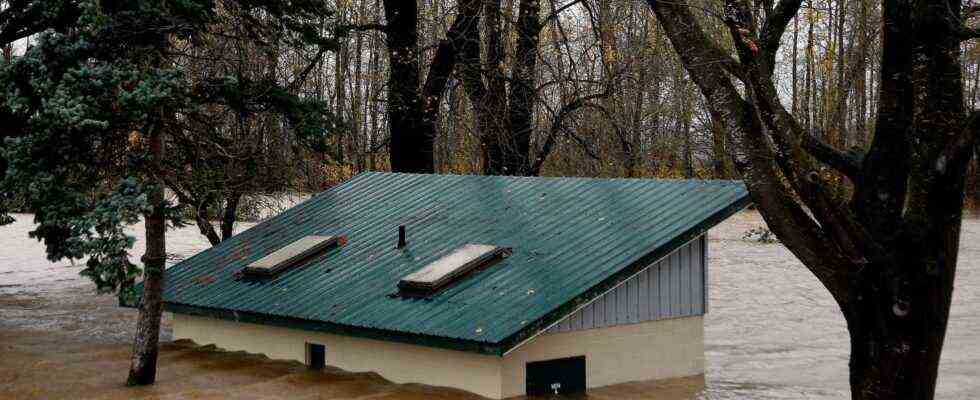Thousands of people evacuated and without electricity, hundreds of others stranded in their vehicles, an oil pipeline stopped: torrential rains led to flooding and landslides, paralyzing, Monday, November 15, several cities in the province of British Columbia, in western Canada.
“After heavy rains, landslides and flooding hit various inland roads in British Columbia”, tweeted the ministry of transport and infrastructure of the province, in the night from Sunday to Monday.
Several highways were in fact closed there in areas already affected this summer by major forest fires. Tens of thousands of people across the province were affected by power cuts, according to Hydro BC. At the end of the day, the emergency services said they had transported the evening before nine patients with minor injuries following a landslide in this area.
“From 80 to 100 vehicles” were also stranded since last night by landslides on a highway near Agassiz, about 100 kilometers east of Vancouver, authorities said at a press briefing in the morning. Rescue teams, firefighters and police are deployed to help them. The Canadian forces in particular sent helicopters to rescue these motorists, approximately 275 people being stranded in their vehicle, including about fifty children, according to the local media.
Thousands of evacuations
Images relayed by local authorities showed the rise of the Similkameen River in southern British Columbia. Others showed the town of Merritt, inundated by the flooding of the Coldwater River. The approximately 7,000 residents of this city located 300 km northeast of Vancouver were ordered to evacuate to emergency centers in the morning, then banned from returning to Merritt after the flooding of sewage treatment plant. Two bridges were also submerged.
“To the people of Merritt and to British Columbians affected by the flooding: be careful”, begged Canadian Prime Minister Justin Trudeau on Twitter, in the afternoon. “We will be there to provide you with the support you need to help you cope with and recover from these floods and extreme conditions”, he promised.
In addition, these bad weather led to the closure of the controversial Trans Mountain pipeline, which was nationalized by Mr. Trudeau’s government in 2018. The pipeline was shut down “As a precaution” confirmed the company to Agence France-Presse, due to “Extensive flooding and mudslides sweeping away debris in the Hope area”, 150 km east of Vancouver. Work to expand the pipeline, which is due to come into service by the end of 2022, has also been halted in the regions of “Lower Mainland, Hope and Merritt due to prolonged torrential rains”. These aim to increase the capacity of this infrastructure, which transports oil from the tar sands of Alberta, the heart of the Canadian oil industry, to Vancouver from 300,000 to 890,000 barrels per day.
A little west of Agassiz, the city of Abbotsford issued an evacuation order for more than a hundred homes after the bad weather. “In just 140 days, Abbotsford recorded its hottest day in history (42.9 ° C) and now the wettest day in history (100.4 mm)”, observed on Twitter Tyler Hamilton, meteorologist from the region.
The Ministry of the Environment, which notes that “Nearly 230 mm” of rain was observed in the Fraser Valley, predicted in the early afternoon another 30 mm of precipitation on Monday.

